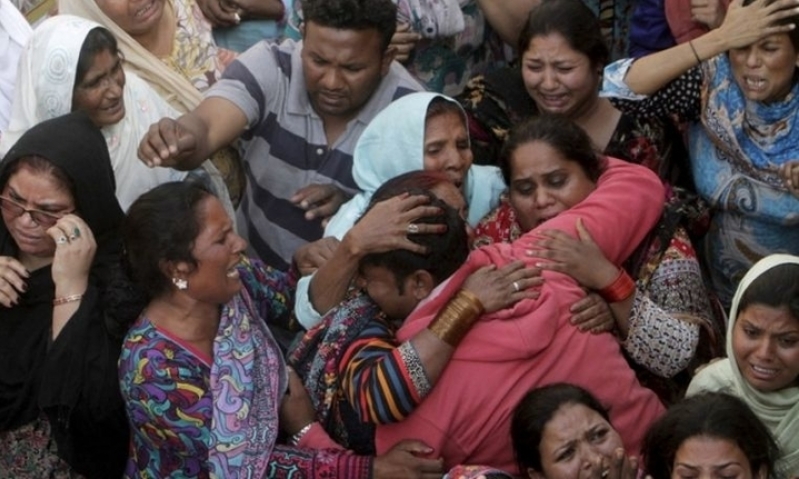
The Muslim superintendent of a hospital in Pakistan has been accused of forcing his Christian staff to memorize Quranic verses -- and carrying out harsh punishments against those who refused to comply.
Dr. Muhammad Sarfaraz, Medical Superintendent of Government Mian Mir* Hospital in Lahore, slapped one Christian employee, Adnan Masih, for refusing to memorize portions of the Quran, and detained another Christian employee, Marshal Ashiq, 23, in a hospital storeroom for two days.
In addition, Christian staff were marked as absent if they did not attend the hospital's morning assembly - such as is held in schools - which all staff (and even patients) were asked to attend to listen to Islamic preaching, reports World Watch Monitor.
Ashiq told WWM: "Sarfaraz...ordered me to recite verses from the Quran. At that time I didn't argue. But when he asked me later, I clearly told him that I cannot do this," he said.
The Christian man told the outlet he'd rather resign than cave into pressure to recite the Quran.
"Later the superintendent ordered security guards to detain me in the storeroom as a punishment and this was repeated the next day too, when I came to the hospital," he said.
"I told Sarfaraz I cannot recite the verses and would prefer to resign. He told me to come to his room. When I went, he said I could stay at home and was free to do that. My colleagues advised me not to do this, because if I was absent, then he could send an absentee report and get me removed from service."
The most senior nurse, Sister Sheeba Mehtab, similarly told WWM that shortly after he was hired last month, the superintendent met with all the nurses or ordered them to memorize the Quran.
"When he came to know that I and another nurse were Christians, [Sarfaraz] asked two Muslim nurses to help us memorize a Quranic Sura," she said. "I didn't argue, but then the two didn't mention it to me. I was on a round with the superintendent when we passed Marshal Ashiq. The superintendent made him stop and asked him if he was doing what he'd asked him. When Marshal refused [to recite the Quran], he called him names.
Sister Mehtab says the superintendent was not rude and insulting only to Christians, but was equally bad tempered and unreasonable to everyone. "He even asked nurses to tell him their mathematics tables," she said.
Ashiq, who recently submitted an application to Mustafabad Police Station seeking protection from - as well as legal action against - Sarfaraz for forcing him to violate his religious beliefs, said that even though Article 20 of the Pakistan Constitution guarantees that no one can be forced into any religious practice or belief against his/her own faith, the police seem to be trying to "cover up" his application.
He also expressed concern that eventually, Sarfaraz will accuse him of blaspheming the Quran. Pakistani law prescribes a fixed death penalty for all those who are found guilty of such a crime.
"The medical superintendent has reached out requesting reconciliation, and does not want me to press charges," Ashiq told WWM. "As a poor Christian, I cannot take a legal stand against him. But I went to the police because I feared he may implicate [me] in religiously motivated criminal proceedings, such as in the blasphemy laws."
Deputy Superintendent Zaman, who headed an investigation into the incident, told WWM that it had found Sarfaraz guilty of misconduct with hospital staff "but [my] team could not confirm if the superintendent actually forced the Christian staff to memorize the Quran."
However, the outlet says it has found no other independent evidence that authorities had intervened in, or even inquired about, the incident.
Pakistan's notorious blasphemy laws often target Christians, which make up just 1.6% of the country's population. The Center for Research and Security Studies in Pakistan estimates that at least 65 people have been killed over blasphemy allegations since 1990, and dozens more convicted of the crime are on death row.
Persecution watchdog Forgotten Missionaries International recently said that in the Islamic-majority country, the principle of "innocent until proven guilty" does not apply to Christians, and often they are seen as guilty as soon as they are accused of blaspheming Islam.
Last week, Christian pastor Zafar Bhatti was sentenced to life in prison on trumped up charges of sending "blasphemous" text messages from his mobile phone.
Pakistan, the world's second largest Muslim country, is ranked #4 on the Open Doors 2017 World Watch List of the worst persecutors of Christians, and has received the maximum score in the violence category.







